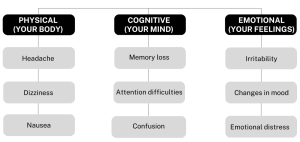Concussion
What is a Concussion?
A concussion, also known as a mild traumatic brain injury (mTBI), occurs as a result of an outside force to the head. These injuries can occur due to assault, fall, or motor vehicle accident and result in changes to how your brain functions.1-3
The number of individuals who have sustained a concussion due to intimate partner violence is often underreported or misdiagnosed.1-3 Research indicates that it can affect anywhere between 19-75% of individuals but could be as high as 100%.2
Signs and Symptoms of a Concussion
After sustaining a concussion there are several symptoms that may occur. Symptoms may be short-term lasting for a few weeks, while some individuals may experience persistent symptoms lasting greater than three months. Review the chart below for common symptoms associated with a concussion.1-2, 4-5

Seeking Medical Help
It is important to seek medical help if you believe a concussion has occurred or have experienced concussion symptoms lasting more than 2-3 weeks to decrease the potential for long-term health impacts.6 Long-term consequences of repetitive concussions can include chronic traumatic encephalopathy, declines in cognitive functioning, changes in mood, and depression.1-2
One of the most common screening tools available to assess if a possible concussion has occurred is the HELPs Brain Injury Screening Tool. When speaking with a healthcare provider you may find it helpful to print and fill out the HELPs screening tool prior to your appointment. DISCLAIMER: This screening tool does not diagnose a concussion as a concussion may only be diagnosed by a licensed medical professional.
Along with using the HELPs screening tool, it may also be helpful to organize your thoughts before your appointment. Click here for a worksheet to organize your concerns. Questions to consider as you fill out this form:
- What symptoms have you been experiencing?
- How are these symptoms impacting your life?
- How long have you experienced these symptoms?
- What other medical conditions have you been diagnosed with that would be important to inform this provider?
Symptom Management
Individual recovery time after a concussion is different for everyone, however, there are several steps you may take to help manage your symptoms. Click on the chart below to learn more about managing these symptoms. 6
For more information on brain injuries please visit: Ohio Domestic Violence Network
Key Takeaways
- Individuals who have experienced domestic violence are at higher risk for having a concussion.
- It is important to speak with a healthcare provider if you believe a concussion has occurred to decreased the potential for long-term health impacts.
- Prior to an appointment with a healthcare professional, you may find it helpful to fill out the HELPs Brain Injury Screening Tool and Concerns Worksheet.
- Strategies for managing concussion symptoms include resting, engaging in relaxing activities, keeping in contact with your social support, and avoiding activities that increase symptoms.
Brain disorder that occurs due to repeated head injuries.
